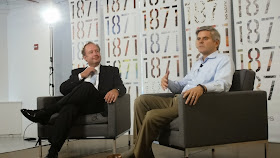Bullish on Chicago tech? So is AOL founder Steve Case - by John Pletz
These days, the founder of America Online is preparing for what comes next. A lot of that opportunity will be in places like Chicago, not Silicon Valley, Mr. Case told a room packed with tech entrepreneurs, investors and other executives yesterday at the 1871 startup incubator in the Merchandise Mart.
“The next 25 years are going to be about the second Internet revolution — using the Internet and other technologies to disrupt industries that haven't changed much in the last 25 years,” said Mr. Case, who invests in tech companies from various funds under the Revolution banner.
Three of the biggest areas will be education, health care and transportation. That favors Chicago and the Midwest, he said in an interview, because “the insights for innovation are likely to come from people with a sense of what's happening in these industries.”
Mr. Case puts his money where his mouth is. He's an investor in Chicago-based BenchPrep, which creates test-preparation and other courses online. The startup also is backed by Lightbank, Eric Lefkofsky and Brad Keywell's venture firm.
Not surprisingly, he sees Washington, where Revolution is based, as a big winner because many of the industries about to be disrupted also are regulated by the government.
Mr. Case is best known for starting AOL and its disastrous merger with TimeWarner at the peak of the dot-com boom. But he's also been a tech advocate in Washington, where he helped push the Jobs Act, which potentially opens the doors to funding tech startups.
A new provision took effect yesterday that allows tech investors, such as angel or venture funds, to solicit investors online, loosening some decades-old restrictions. A crowdfunding provision, which many see as unlocking a big source of new capital for startups from everyday investors, still hasn't been fully implemented.
But Mr. Case is bullish on both. “It's about unlocking more capital,” he told me. “The general solicitation provision will help create other venture firms, and it will help some other venture firms scale up.
(Crowdfunding) can be a game-changer for entrepreneurs, particularly in places that don't have a lot of access to capital.”
Mr. Case's work in Washington isn't done. He's pushing hard for immigration reform, which tech companies see as crucial to retaining foreign students trained at U.S. universities. “There's general agreement on that,” he said.
But border security and citizenship for undocumented immigrants are politically divisive, which threatens to stall the overall issue.
“I'm an entrepreneur, so I'm an optimist,” he said. “If it doesn't happen by the end of the year, there's a chance we lose our moment. The next few weeks will be crucial.”
Follow John on Twitter at @JohnPletz.





